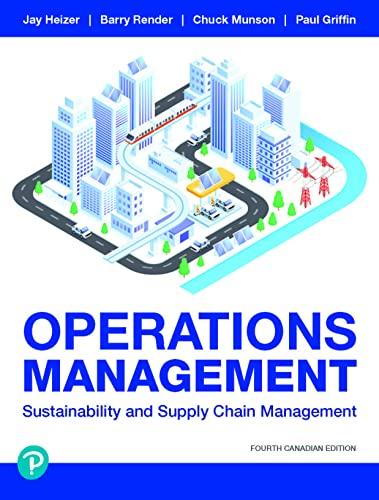Answered step by step
Verified Expert Solution
Question
1 Approved Answer
Page 1 of 2 IE 4 8 2 0 / 6 8 2 0 Fall 2 0 2 3 Lab 2 Due: Tuesday, November 2
Page
of
IE Fall
Lab
Due: Tuesday, November at :pm
Complete this assignment in teams of two!
Problem : Inspired by Exercise
In the TieDye TShirt model, the owner is expecting the business to grow during the summer season. The
owner is interested in estimating the average time to produce an order and the utilization of the workers if
the arrival rate for orders increases. Rerun the model for eighthour days with the arrival rate increased
by and percent. Will the system have trouble meeting the demand? Perform your simulation
runs in Process Analyzer, reporting on system time, shirtmaker utilization, and packager utilization. Use
the statistics provided in Process Analyzer to justify your conclusions.
Problem : Inspired by Exercise
As part of a diabetes prevention program, a clinic is considering setting up a screening service in a local
mall. They are considering two designs: Design A: After waiting in a single line, each walkin patient is
served by one of three available nurses. Each nurse has their own booth, where the patient is first asked
some medical health questions, then the patients blood pressure and vitals are taken, finally, a glucose
test is performed to check for diabetes. In this design, each nurse performs the tasks in sequence for the
patient. If the glucose test indicates a chance of diabetes, the patient is sent to a separate clerk to schedule
a followup at the clinic. If the test is not positive, then the patient departs.
Design B: After waiting in a single line, each walkin is served in order by a clerk who takes the patients
health information, a nurse who takes the patients blood pressure and vitals, and another nurse who
performs the diabetes test. If the glucose test indicates a chance of diabetes, the patient is sent to a separate
clerk to schedule a followup at the clinic. If the test is not positive, then the patient departs. In this
configuration, there is no room for the patient to wait between the tasks; therefore, a patient who has had
their health information taken cannot move ahead unless the nurse taking the vital signs is available. Also,
a patient having their glucose tested must leave that station before the patient in blood pressure and vital
checking can move ahead.
Assume that there is an chance stream that the glucose test will be positive. For design A the
time that it takes to have the paperwork completed, the vitals taken, and the glucose tested are all
lognormally distributed with means of and minutes respectively streams They
all have a standard deviation of approximately minutes. For design B because of the specialization of
the tasks, it is expected that the mean of the task times will decrease by
Assume that the mall opens at am and that the system operates until pm Patients arrive to the system
according to a Poisson process that has an average rate of per hour for the entire day. During the time
from am to noon the arrivals are less than the overall arrival rate. From am to noon, the rate is
only per hour. From noon to pm the rate increases to per hour. From pm to pm the traffic
lightens up again, back to per hour. From pm to pm the rate is per hour and finally from pm to
pm the rate is per hour. Assume that the clinic is open from am to pm hours each day and
that any patients in the clinic before pm are still served. The distribution used to model the time that it
takes to schedule a follow up visit is also lognormally distributed with mean minutes and standard
deviation minute stream
Make a statistically valid recommendation as to the best design based on the average system time of the
patients. We want to be confident of our recommendation to within minutes.
Additional Comments:
You need to specify how the patient arrival rate changes across the day for different time
periods. You cannot specify a stream number for this type of arrivals...dont worry about this.
Run the model until ALL patients have been served. You will need to create your arrivals
schedule such that no more patients arrive after pm
Recommend one screening service design based on the following performance measures:
a Average time in system as stated in the problem
b Probability of greater than a fiveminute wait
Arena automatically captures the total amount of waiting time for any entity. To find this in
Build Expression you would look under Special Purpose Attributes Times and there you
can find the syntax for the total waiting time. Or you can create your own statistic.
Conduct the Compare Means tests within Output Analyzer. Report the test results recommended
screening service as well as report the resulting halfwidth found on the Compare Means tests.
If you did not use a complete CRN common random numbers approach and instead used
independent samplin
Step by Step Solution
There are 3 Steps involved in it
Step: 1

Get Instant Access to Expert-Tailored Solutions
See step-by-step solutions with expert insights and AI powered tools for academic success
Step: 2

Step: 3

Ace Your Homework with AI
Get the answers you need in no time with our AI-driven, step-by-step assistance
Get Started


